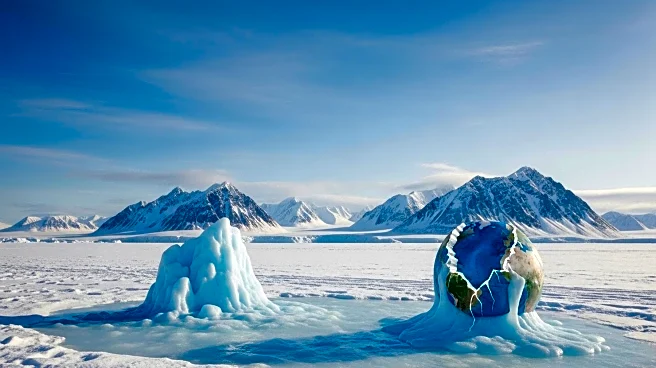What's Happening?
A recent study published in Frontiers in Science has raised concerns about geoengineering proposals aimed at cooling the Arctic and Antarctic regions. These proposals include methods such as spraying reflective particles into the atmosphere and using underwater curtains to prevent warm water from melting ice shelves. The study, conducted by an international team of scientists, evaluated five prominent geoengineering ideas and concluded that none are viable due to environmental risks, feasibility issues, and high costs. The report highlights that these methods could cause severe environmental damage and distract from the urgent need to reduce carbon emissions.
Why It's Important?
The significance of this study lies in its potential impact on climate policy and research. Geoengineering has been considered a possible solution to mitigate climate change effects, especially in polar regions where warming is most pronounced. However, the study's findings suggest that these interventions could exacerbate environmental problems rather than solve them. This could influence policymakers to focus more on emission reduction strategies rather than investing in unproven geoengineering techniques. The report also underscores the importance of international cooperation in addressing climate change, as unilateral geoengineering efforts could lead to geopolitical tensions.
What's Next?
The study calls for a shift in focus towards reducing greenhouse gas emissions and conducting fundamental research in polar regions. It suggests that further exploration of geoengineering techniques may not be a productive use of resources. The findings may prompt governments and research institutions to reconsider funding allocations for geoengineering projects and prioritize emission reduction initiatives. Additionally, the study may lead to increased scrutiny of geoengineering proposals and foster debates about their ethical and practical implications.
Beyond the Headlines
The ethical and governance challenges associated with geoengineering are profound. Deploying such techniques in international waters raises questions about jurisdiction and accountability. The potential for unintended consequences, such as altering global weather patterns, adds complexity to the debate. Furthermore, the study highlights the risk of creating false hopes that geoengineering could be a quick fix for climate change, potentially delaying necessary actions to reduce emissions.









